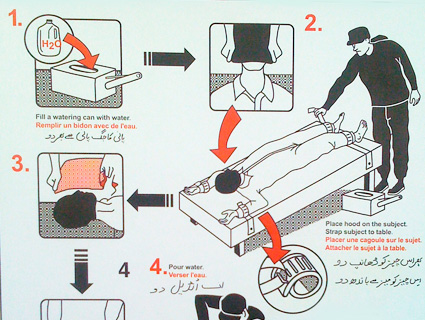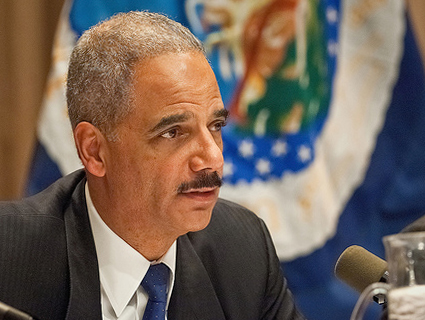Mitt Romney’s national security advisers have quietly urged him to reverse President Barack Obama’s 2009 executive order that outlawed the use of interrogation techniques that amounted to torture, according to a 2011 policy memo obtained by Charlie Savage of the New York Times.
The memo, which contains a number of factual errors and misleading statements, lays out two courses for a President Romney: Either immediately promise to rescind Obama’s executive order upon taking office, or initiate a “comprehensive review” of interrogation policy that ends with Romney rescinding Obama’s executive order. Though the outcome of the “review” is never in doubt, the memo states that the latter policy will make Romney appear “open-minded and empirically driven.” The memo does not appear to have a single author, but Savage reports that it was the product of an 18-person policy committee packed with Bush administration lawyers.
Strangely, the memo is somewhat agnostic in its belief about whether or not the so-called “enhanced interrogation techniques” actually work. “It is difficult to settle the question definitively,” the memo states, adding later that “it is difficult to argue conclusively that enhanced interrogation techniques would have generated more information than the techniques in the Army Field Manual; we simply don’t know what we don’t know.” Contrast that with the blanket assertions from conservatives that abandoning torture left the US vulnerable to terrorist attacks.
Beyond these qualifications, the memo lays out an extraordinarily weak case for “enhanced interrogation,” with some basic factual errors. Namely:
- It credits the waterboarding of Khalid Sheik Mohammed for disrupting the so-called “Second Wave,” a plot to crash another airplane into the Library Tower in Los Angeles. The only problem is the Bush administration publicly took credit for foiling that plot in 2002, and KSM was captured in 2003. Oops!
- The memo states that waterboarding detainee Abu Zubayda led to the identification of KSM as the architect of the 9/11 attacks. But former FBI Agent Ali Soufan has said that he extracted that information from Zubayda before he was waterboarded.
- The memo claims that former Obama administration CIA Director Leon Panetta “confirmed” that “waterboarding and other enhanced interrogation techniques helped extract ‘useful information'” that lead to the discovery of Osama bin Laden’s whereabouts. Only that’s not exactly what Panetta said: In the letter referred to in the memo, Panetta states that some detainees who “had been subjected to enhanced interrogation techniques” had provided “useful information.” That’s not the same as saying they provided the information while being tortured. More importantly, in the same letter, Panetta notes that detainees like KSM, who had been subject to the harshest techniques, still lied to interrogators about the identity of the courier who eventually lead the US government to Bin Laden’s compound in Pakistan.
The last four years are a trail of broken promises on civil liberties, from warrantless surveillance to indefinite detention. However, one of President Obama’s most uncompromising accomplishments was banning torture through executive order on his first day in office. Still, the administration’s use of the state secrets doctrine to shield both the legal architects and corporate enablers of the Bush torture program, and its refusal to prosecute those who went beyond the “legal” torture sanctioned by the Justice Department have left open the possibility that torture could again become US policy. A future president could simply reverse Obama’s executive order and bring back Bush-era coercive interrogation techniques, which is exactly what the Romney memo proposes to do.












